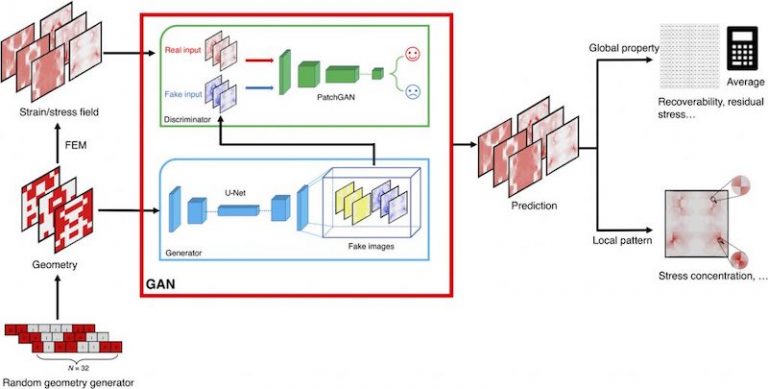
Researchers at the Massachusetts Institute of Technology (MIT) presented a developed artificial intelligence tool earlier this month. This deep learning model will be able to determine the stress and strain of a material through image analysis and computer vision. It can be used by engineers, mainly in the context of material testing.
The deep learning tool developed by Zhenze Yang (lead author and PhD student in the Department of Materials Science and Engineering), Chi-Hua Yu (former MIT postdoc) and Markus J. Buehler (Director of the Atomic and Molecular Mechanics Laboratory and Professor of Engineering at McAfee), uses computer vision to enable, among other things, the generation of material stress estimates (fatigue, stress, strain, etc.) in real time.
A generative adversarial network (GAN) was trained using thousands of matched images. Each pair of images consists of the internal microstructure of the material when subjected to mechanical forces and colour-coded stress and strain values. GAN uses game theory to determine the relationship between the appearance of the material and the stresses to which it is subjected.
Markus Buehler commented on the use of this tool for stress-strain problems in materials:
“This is always a difficult problem. It’s very expensive and it can take days, weeks or even months to run certain material simulations. So we thought, let’s teach an AI to solve this problem. […] From an image, the computer can predict all these forces: deformations, stresses, etc.”
Artificial intelligence can also recontextualize problems like the development of cracks in a material. The neural network, once trained, can run on computer processors of all types. This tool could therefore be used in the field with the help of a photo taken at a given moment, for example.
The researchers said this advance could allow for faster design prototyping and material inspections. Materials testing is a fundamental step in understanding structure, strength and better anticipating risk. In these tests, engineers can reveal the internal forces in a material that can cause it to deform or break. Such calculations could help anticipate risks and understand how an X-bridge would stand up in the midst of heavy traffic or high winds.
Translated from Des chercheurs du MIT présentent un outil de deep learning pour analyser la contrainte des matériaux à partir de photos









